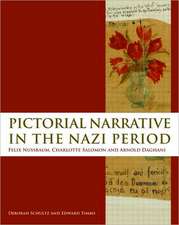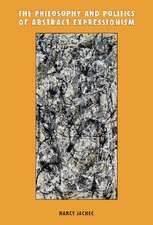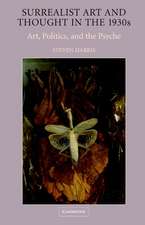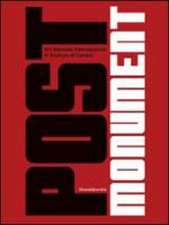Humor in Global Contemporary Art
Editat de Mette Gieskes, Gregory H. Williamsen Limba Engleză Hardback – mai 2024
Preț: 576.96 lei
Preț vechi: 820.73 lei
-30% Nou
Puncte Express: 865
Preț estimativ în valută:
110.40€ • 115.58$ • 91.35£
110.40€ • 115.58$ • 91.35£
Carte disponibilă
Livrare economică 15-29 martie
Preluare comenzi: 021 569.72.76
Specificații
ISBN-13: 9781350415829
ISBN-10: 1350415820
Pagini: 352
Ilustrații: 16 colour and 90 bw illus
Dimensiuni: 156 x 234 mm
Greutate: 0.95 kg
Editura: Bloomsbury Publishing
Colecția Bloomsbury Visual Arts
Locul publicării:London, United Kingdom
ISBN-10: 1350415820
Pagini: 352
Ilustrații: 16 colour and 90 bw illus
Dimensiuni: 156 x 234 mm
Greutate: 0.95 kg
Editura: Bloomsbury Publishing
Colecția Bloomsbury Visual Arts
Locul publicării:London, United Kingdom
Caracteristici
Global range of contributors, with four independent sections structured around four continental regions: Africa and the Middle East; Asia and Oceania; South and North America; and Europe
Notă biografică
Mette Gieskes is Assistant Professor at Radboud University, The Netherlands.Gregory H. Williams is Associate Professor of Contemporary Art at Boston University, USA.
Cuprins
List of Plates List of FiguresNotes on ContributorsAcknowledgements Introduction, Mette Gieskes (Radboud University, the Netherlands) and Gregory Williams (Boston University, USA)Part One: Africa and The Middle East1. Negotiated Space: Visual Satire in Contemporary Diasporic Nigerian Art, Yomi Ola (Spelman College, USA)2. Lerato Shadi's Sugar & Salt: Laughter beyond Languages, beyond Generations, in South Africa and in the World, Katja Gentric (University of the Free State, South Africa and Centre Georges Chevrier, France)3. Humorous Art Practices in the Contemporary Middle East: Reacting to Cultural Stereotypification, Hamid Keshmirshekan (SOAS, UK)4. Humor and the Enactment of Statehood: Khalil Rabah and Anticipatory Aesthetics in Palestine, Chrisoula Lionis (University of New South Wales, Australia)Part Two: Asia and Oceania5. Crossing the Line: Artistic Jests about the Border Struggles of Pakistan and Palestine, Atteqa Ali (Zayed University, UAE)6. Humor/Youmo in Chinese Contemporary Art and Online Visual Culture: Oblique Resistances to Authority and the Traces of Confucian-literati Aesthetics, Paul Gladston (University of New South Wales, Australia)7. We Require Clear Slogans: Humor in the Russian Monstration, Maria Sidorkina (University of Texas, USA) and Jacob Stewart-Halevy (Tufts University, USA)8. The Trickster, Provocateur, Clown, and Joker: Radical Humor in Contemporary Indonesian Art, Michelle Antoinette (Monash University, Australia)9. "It's Funny Now, Aye": Humor and Contemporary Art from Oceania, Caroline Vercoe (University of Auckland, New Zealand)Part Three: South and North America10. In the State of Play: Slapstick Enactments and Carnivalesque Humor as Political Subversion in Brazilian Contemporary Art, Denise Carvalho (Independent Curator and Critic, USA)11. Reír por no llorar: Black Humor in Contemporary Venezuelan Feminist Art, Tatiana Flores (Rutgers, USA)12. Mordacious Humor and Happy Oblivion in Columbia: Bernardo Salcedo's Distinguishing Features, Gina McDaniel Tarver (Texas State University, USA)13. The Necessity of Jimmie Durham's Jokes, Richard Shiff (The University of Texas at Austin, USA)Part Four: Europe14. Droll "Observations": Roman Ondak's Comic Displacements, Sophie Knezic (University of Melbourne, Australia)15. The Ersatz Art School and Councils within Councils: Playful Dutch Institutions of Critique in the 1960s, Janna Schoenberger (Amsterdam University College, the Netherlands)16. Zizek's Joke: Humor and Over-identification in Post-Yugoslav Art, Marko Ilic (UCL, UK)17. Aesthetic Incongruity: Art and Humor in Post-Independence Azerbaijan, Monica Steinberg (University of Southern California, USA) Index
Recenzii
There is a specter haunting contemporary art and its name is humor. Gieskes and Williams have assembled an impressive group of scholars who span continents and contexts, exploring the work of artists who know how to provoke laughter while spurring critical thinking. Comedic gadflies of the globe unite!
Exploring a topic long overlooked, this book cogently shows that artistic humor comes in many guises: as parody, irony, (tragi)comedy, anecdotes, trickster's pranks, jokes, puns, or mocked clichés; as (self)criticism, dark humor, tongue-in-cheek jest, or fake news. In all cases, though, the humorous signifiers are culturally and politically coded and context-dependent.
Upping the antics of funny scholarship, this timely anthology offers a uniquely wide-angled perspective; from Pakistan and Palestine to Asia and Aotoroa/New Zealand; on formations of global, national, regional and local humor. Traveling outside the Freudian slipstream, this volume tracks how comedy plays out in border conflicts, stereotypes, activism and community and identity formations. It leavens, sublimates and jousts with, even ameliorates, our whole earth catalogue of woes.
Exploring a topic long overlooked, this book cogently shows that artistic humor comes in many guises: as parody, irony, (tragi)comedy, anecdotes, trickster's pranks, jokes, puns, or mocked clichés; as (self)criticism, dark humor, tongue-in-cheek jest, or fake news. In all cases, though, the humorous signifiers are culturally and politically coded and context-dependent.
Upping the antics of funny scholarship, this timely anthology offers a uniquely wide-angled perspective; from Pakistan and Palestine to Asia and Aotoroa/New Zealand; on formations of global, national, regional and local humor. Traveling outside the Freudian slipstream, this volume tracks how comedy plays out in border conflicts, stereotypes, activism and community and identity formations. It leavens, sublimates and jousts with, even ameliorates, our whole earth catalogue of woes.





